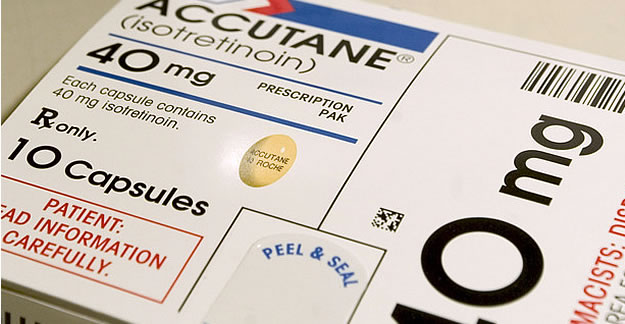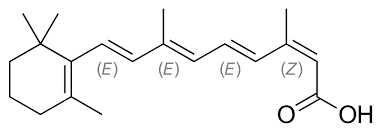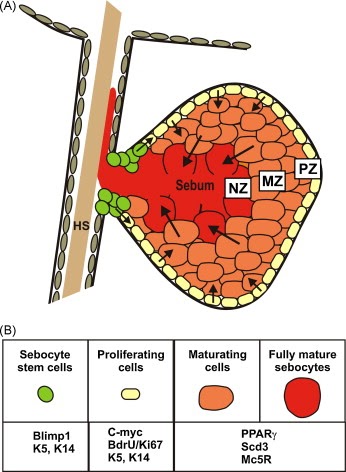The miracle drug: A look into Accutane and its mechanism
Patrick Nguyen. 10/05/2020

It all starts with a pimple at the age of 13. You brush it off hoping for it to go away in a few days but then another comes up. Now at the age of 16, your face has fully broken out and after spending hundreds of dollars on skincare products and antibiotics, nothing seems to work. You head to the dermatologist in desperation and they recommend the oral use of Isotretinoin, also known as Accutane. This is a common occurrence in many teens who face self-esteem issues and anxiety regarding acne.
Accutane is known for its miraculous effect of curing severe forms of acne. However, this oral drug is infamous for the intense regulation and monitoring that your local dermatologist has to conduct when taken. Although there are minor side effects such as dryness and sensitivity in the skin, Accutane has been linked to depression and mental issues Additionally, there are monthly checkups and multiple forms that you have to fill out specific to Accutane. Why does a drug that cures something as non-threatening as acne require so much regulation? Let’s analyze the pharmacology and mechanism of the miracle drug to see what’s going on here.

To start, your sebaceous glands, located in the dermis (region below the outermost layer of your skin), naturally produce an oil called sebum made up of lipids such as triglycerides and fatty acids. This keeps your face hydrated and maintains a barrier from the outside world. However, many patients with acne overproduce sebum, therefore clogging their pores. That’s when Propionibacterium acnes (P. acnes), a naturally occurring bacteria that live on your skin, come in. These bacteria love to live in sebum, so with more sebum, there come more P. acnes. As a result, your skin induces an immune response as a result of the excessive amount of P. acnes, which leads to acne. Accutane then comes in to reduce sebum production by shrinking the oil glands. When the oil glands do not produce sebum, P. acnes cannot colonize, and therefore, there is a reduction in skin inflammation. However, let’s dive into this more deeply from a biochemical point of view.
Accutane (13-cis-retinoic acid) is a derivative of Vitamin A which has been proven to be beneficial for the skin in many ways. Forms of Vitamin A are called retinoids and they include other medications such as Tretinoin, which is also used in acne treatment. Although the exact mechanism of Accutane is unknown, there are key chemicals that have been noted to contribute to the efficacy of Accutane. Once Accutane is introduced into the body, it increases the levels of neutrophil gelatinase-associated lipocalin (NGAL). NGAL has been observed to increase the apoptosis (programmed cell death) of sebocytes. Sebocytes are the cells involved in the sebaceous glands and the production of sebum. Because NGAL leads to apoptosis in the sebaceous gland, there is less sebum produced in the skin. According to a research paper by Marcus Miethke and Arne Skerra, NGAL also interferes with the colonization of P. acnes by interfering with a certain mechanism regarding iron acquisition. This gives Accutane its antimicrobial properties against the gram-positive bacteria. Although there are many other factors that come into play, NGAL is key. There is still a lot of gray area concerning the exact processes, which has led to multiple studies being conducted today.

So why does Accutane have a connection with mental problems in patients? According to a study on mice and rats regarding the psychopathology of Isotretinoin, researchers have come to the conclusion that retinoids (derivatives of Vitamin A) bind to dopaminergic receptors in the central nervous system (CNS). This disrupts the structure of the receptors and neurotransmission in the brain leading to a decrease in dopamine levels. Dopamine is known as the chemical linked with happiness and excitement. Although there are other mechanisms that occur in the brain due to Isotretinoin, it is safe to assume that it does indeed affect the nervous system, explaining why there are many regulations regarding this drug.
The next time you go to the dermatologist for a solution to your acne, remember to take the time to consider the potency of this drug and its drawbacks. Accutane is a very powerful drug and can affect the body as a whole. If you are on Accutane and have experienced depression, headaches or suicidal thoughts, it is urged to stop taking the medication immediately. Although the drawbacks are daunting, it is not a common occurrence in all patients. Speaking from my personal experience, there have only been events of dryness on the skin and nosebleeds. The miracle drug has the ability to permanently cure your acne after several months of dosage and monitoring, leading to a happier, more confident individual.
Cover Photo: (Hospital & Healthcare Management)

Patrick is a junior at Sage Hill School who enjoys studying cosmetic science and playing tennis. Through InterSTEM, Patrick aspires to help underrepresented communities have access to STEM education and stimulate their curiosity for science.